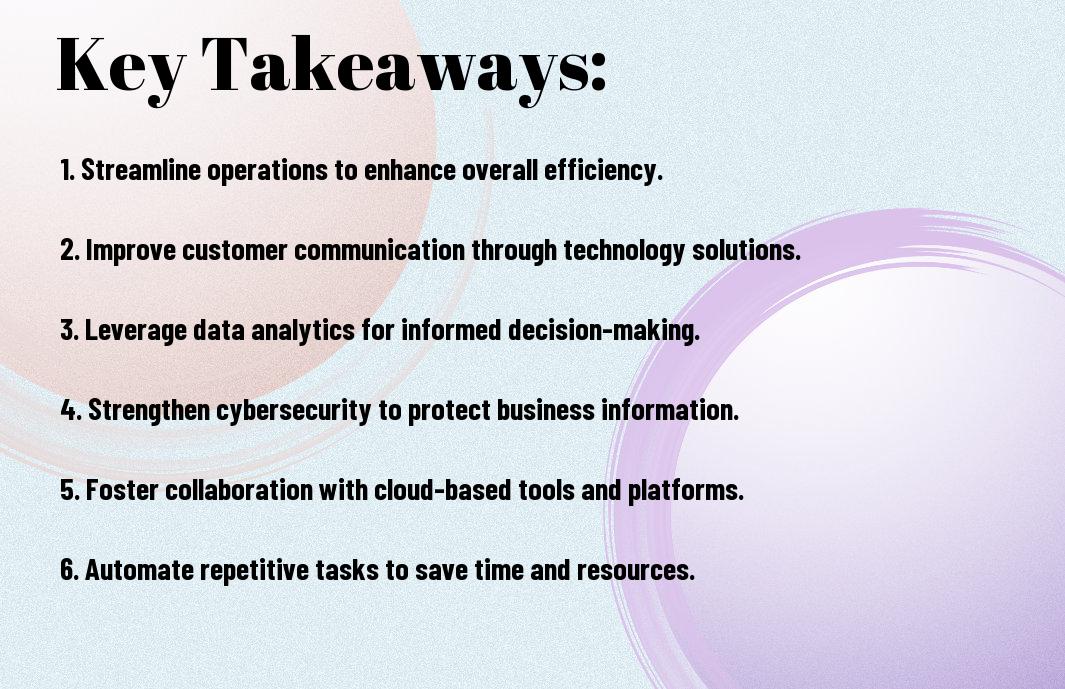
Business growth hinges on efficient operations and technology integration, making IT services a vital component for your small business. With the right IT support, you can enhance productivity, streamline processes, and improve customer engagement. In this post, we’ll explore how investing in IT services can empower your ventures, giving you the tools you need to compete in a rapidly evolving marketplace while ensuring your business runs smoothly and securely.

Understanding IT Services
Your journey into IT services begins with a clear understanding of what they encompass. IT services play a vital role in managing, maintaining, and supporting your business’s technology needs. From software development to network management, these services collectively enhance efficiency and productivity while ensuring your operations run smoothly.
Definition and Scope
The scope of IT services includes a wide range of functions imperative for today’s digital businesses. These services not only cover technical support but also include strategic planning, system integration, and maintenance of IT infrastructure. Effectively leveraging these offerings allows you to focus on your core business goals.
Types of IT Services for Small Businesses
On your path to digital optimization, various IT services can support your small business. Here are some key types:
- Managed IT Services
- Cloud Computing Solutions
- Data Backup and Recovery
- Cybersecurity Services
- Software Development
Knowing the options available can significantly impact your business’s efficiency and growth.
| Type of IT Service | Description |
| Managed IT Services | Outsourced IT management for controlling daily operations. |
| Cloud Computing | Access to virtual computing resources over the internet. |
| Data Backup | Solutions for securing business data and ensuring recovery. |
| Cybersecurity | Protective measures against online threats and data breaches. |
| Software Development | Creation of custom applications tailored to business needs. |
Understanding the types of IT services available enables you to select the solutions that align with your business objectives. Incorporating the appropriate services can streamline operations and enhance productivity. Here’s a breakdown of types and their core benefits:
- Improved efficiency and operational flexibility
- Enhanced data security and compliance
- Reduced operational costs through outsourcing
- Access to the latest technology and trends
- Continuous support and maintenance for IT infrastructure
Knowing how these services can provide strategic advantages allows you to make informed decisions for your business.
| Benefit | Description |
| Efficiency | Streamlined processes through technology integration. |
| Security | Protection of sensitive information from threats. |
| Cost Savings | Reduction in overhead through outsourced services. |
| Flexibility | Scalability to accommodate changing business needs. |
| Support | Access to expertise and troubleshooting assistance. |

Enhancing Operational Efficiency
The integration of IT services can significantly enhance your operational efficiency. By streamlining processes, reducing redundancies, and facilitating better communication, you can allocate your resources more effectively. This allows you to focus on your core business objectives while technology handles routine tasks, ultimately saving you time and money in the long run.
Automation Tools
Around the landscape of small businesses, automation tools play a pivotal role in enhancing operational efficiency. These tools can automate repetitive tasks, manage workflows, and even streamline communication, empowering you to focus on more strategic initiatives. By utilizing these intelligent solutions, you can reduce human error and improve productivity within your team.
Cloud Computing Solutions
Operational flexibility is a significant benefit of cloud computing solutions. By storing your data in the cloud, you gain access to real-time information from anywhere, enabling effective collaboration among your team members. Additionally, cloud services offer scalability, allowing you to adjust your resources based on your business needs without significant investments in physical infrastructure.
Cloud solutions provide you with a comprehensive platform for data management and applications, which can be tailored to your specific needs. This means that you can easily access imperative tools and resources without worrying about hardware limitations. Furthermore, most cloud providers emphasize security measures, ensuring that your data remains safe and protected against potential cyber threats. By leveraging cloud computing, you can also foster innovation by rapidly deploying new services, ultimately enhancing your business agility.
Improving Customer Experience
Once again, enhancing your customer experience is paramount for small businesses seeking growth. IT services can streamline interactions and personalize communications, making your clients feel valued and appreciated. From quick response times to tailored offerings, leveraging technology enables you to forge deeper connections with your customers, ultimately fostering loyalty and encouraging repeat business.
Customer Relationship Management (CRM) Systems
Across your small business, implementing a robust CRM system allows you to manage customer interactions effectively. This tool not only organizes customer information but also tracks communications, making it easier for you to engage with clients proactively. By analyzing customer data, you can tailor your marketing efforts and improve overall satisfaction.
IT Support for Enhanced Communication
Against a backdrop of evolving consumer expectations, maintaining effective communication channels is vital. IT support can help you utilize modern tools that facilitate swift communication, allowing you to respond to customer inquiries promptly and efficiently.
Enhanced communication leads to a superior customer experience, as IT support ensures that your email, chat, and phone systems are functioning smoothly. By investing in reliable communication tools, you enable your team to connect with customers effortlessly and deliver timely support. This proactive approach not only resolves issues quickly but also reassures your clients that you value their time and concerns, fostering long-term relationships and boosting customer satisfaction.
Data Security and Compliance
All small businesses face the challenge of safeguarding sensitive information while adhering to industry regulations. By leveraging IT services, you can implement robust data security measures to protect your customer and business data. Compliance not only avoids hefty fines but also builds trust with your clients, demonstrating that you take their privacy seriously.
Importance of Cybersecurity
Across industries, the rise of cyber threats underscores the need for strong cybersecurity. As a small business owner, you must prioritize protecting your digital assets. A single breach can result in financial losses, regulatory penalties, and reputational damage that could take years to recover from.
Regulatory Compliance and Best Practices
Along with cybersecurity measures, regulatory compliance is vital in maintaining your business’s integrity. Ensuring that your operations align with industry standards not only protects your business but also builds customer confidence. Staying informed about applicable laws and regulations is vital for ongoing compliance.
To successfully navigate regulatory compliance, you should invest time in understanding the laws that apply to your industry. Implementing best practices, such as regular audits, employee training, and maintaining up-to-date security systems, can help you remain compliant. By doing so, you minimize legal risks and foster a culture of accountability within your organization, ensuring a safer environment for both your business and your clients.
Cost-Effectiveness of IT Solutions
For small businesses, cost-effectiveness is vital to maximizing profitability. Leveraging IT solutions can provide you with the tools necessary to streamline operations, reduce overhead, and enhance productivity. By opting for tailored IT services, you can minimize expenses associated with technology investments, ultimately allowing you to allocate resources more efficiently toward growth and development.
Comparing In-House vs. Outsourced IT
Cost Analysis of IT Options
| In-House IT | Outsourced IT |
|---|---|
| Higher initial setup costs, including hiring and training | Lower initial costs, pay only for services used |
| Ongoing expenses for salaries and benefits | Predictable monthly fees, no payroll burdens |
| May require additional investments for infrastructure | Includes access to advanced technologies and solutions |
Long-Term Financial Benefits
By investing in IT solutions, you position your business for sustainable long-term growth. Initially, you might incur some costs, but these solutions often yield significant savings over time through enhanced efficiency and reduced operational expenses. With better data management and streamlined processes, you can focus on core business activities that generate revenue.
Understanding the long-term financial benefits of IT solutions helps you recognize the valuable return on investment they provide. Improved efficiency means that employees spend less time on mundane tasks, freeing them up for strategic initiatives. Additionally, employing scalable IT services enables you to adapt to changing market demands without incurring heavy expenses. Ultimately, this adaptability can lead to significant cost savings and increased profitability in your small business over the years.
Future-Proofing Your Business
Unlike many traditional business models, integrating IT services into your operations allows you to adapt swiftly to changes in the market. This future-proofing enables you to remain competitive and responsive to customer needs, streamlining processes and improving efficiency. By leveraging technology, you empower your business to navigate uncertainties with confidence and ensure sustained growth in an ever-evolving landscape.
Scalability of IT Services
An vital advantage of IT services is their scalability, which allows you to grow your business seamlessly. As your company expands, whether through increased demand or the addition of new products, scalable IT solutions can be adjusted to meet your evolving needs without significant disruption. This flexibility ensures that you can easily manage resources and costs while focusing on your core business objectives.
Staying Ahead with Technological Trends
At the heart of a successful business strategy is the ability to stay ahead of technological trends. By embracing IT services, you can utilize cutting-edge tools and techniques that enhance your operations and customer experiences. This proactive approach empowers you to adapt to industry shifts and position your business as a leader in your field.
In addition to improving your operational efficiency, keeping up with technological trends helps you anticipate market changes and customer preferences. By integrating advanced solutions like cloud computing, artificial intelligence, or data analytics into your strategy, you can harness insights that drive innovation. Being proactive about technology ensures that you not only meet current demands but also set the stage for future opportunities, allowing your small business to thrive in a competitive landscape.
Final Words
With this in mind, leveraging IT services can significantly enhance your small business endeavors by streamlining processes, improving communication, and increasing efficiency. By adopting modern technology solutions tailored to your specific needs, you can focus on driving growth and innovation. IT services equip you with the tools to manage data effectively, enhance customer experiences, and stay competitive in today’s fast-paced market. Ultimately, investing in technology not only supports your current operations but also paves the way for future success.